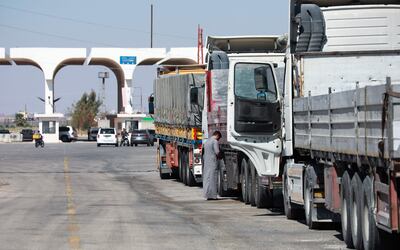Nael Al Radi stuffed his grey saloon car with cheap toilet paper, tissues and other perishable goods made in Jordan and drove into Syria on Wednesday for the first time since border restrictions were eased this week.
On the way back, the Jordanian trader will bring meat, nuts and cotton underwear — goods that cost little because he pays for them in Syrian pounds, a currency that has collapsed over the past decade as the country's economy deteriorated during the civil war.
“The situation is so bad in Syria that they will take anything,” said Mr Al Radi. “The stuff they still produce has become so cheap to buy with Jordanian dinars.”
Jordan and Syria relaxed border restrictions this week as the kingdom moved to accommodate the regime of President Bashar Al Assad.
Despite the relaxation of restrictions, the flow of traffic across the border was subdued, with only small numbers of vehicles making the trip across the Jaber-Nassib crossing in Syria's south-west.
Observers say part of Jordan's calculus is based on potential commercial gains and pragmatism in dealing with a regime that King Abdullah described two months ago as having “longevity".
With other Middle Eastern countries as well as Russia having normalised relations with the Assad regime, Jordan has been driven to boost ties with the Syrian president, diplomats in Amman say.
The Jabber-Nassib crossing
The Jaber-Nassib crossing reopened in 2018, shortly after a deal between Russia, the US and Israel returned large rebel parts of southern Syria to the regime.
After an agreement was reached at a ministerial meeting in Amman this week, goods and passengers in Jordanian vehicles will no longer be required switch to Syrian vehicles and vice versa.
Small merchants like Mr Radi, nicknamed “sailors”, were previously allowed only limited trips to Syrian-regime areas.

As of this week, Mr Radi can go to Syria four times a month in pursuit of his trade.
Before the Syrian revolt in 2011 against five decades of Assad family rule and the ensuing civil war, he was allowed to cross into Syria four times a day.
Mr Radi says his business will still be profitable because unlike other sailors, he owns his car. He is one of an estimated 2,000 itinerant Jordanian merchants who mostly come from Ramtha, the main Jordanian city on the border with Syria.
The cost of bribes required on the Syrian side has risen sharply in the past decade, he said.
He cited more regime personnel and pro-Assad militias demanding money along the main motorway to Damascus as the reason behind the increase.
“Before, it was a couple of dinars here and there. The amount is still the same but we have to fork over the cash to more people,” Mr Radi said.
Traffic through Jaber-Nassib before 2011 was mainly cargo transit from Turkey and Europe to inner Arabia. A large proportion of Lebanon's farm exports to the Gulf also flowed by lorry through the crossing.
But border crossings between Turkey and Syria have been closed or have fallen outside the regime's control in the past decade. In April, Saudi Arabia banned imports of Lebanese produce due to concerns over drug smuggling.
The crossing also handled much of Jordanian-Syrian trade, which was limited even before 2011.
In 2010, the last year before the Syrian revolt, World Bank data show Jordanian exports to Syria only reached $256.4 million out of Jordan’s $7 billion in total exports.
Syrian exports to Jordan in 2010 reached about $405.9m out of Syria’s $11.3bn in total exports.
Hundreds of thousands of Syrians fled to Jordan over the past decade, many of them rural Sunni Muslims from southern Syria, the birthplace of the revolt.

The majority of Syria's population is Sunni, but the country has been dominated by members of the minority Alawite sect since the 1963 coup.
When the Jaber-Nassib crossing reopened in 2018, the Syrian regime invited the overwhelmingly Sunni refugees in Jordan to return and set up a centre on its side for processing purposes.
But few returned, fearing persecution or conscription in the military.
Syrian merchant Nawar Hamed, who resides in Amman, used to drive to Damascus through the crossing every two weeks before 2011.
Mr Hamed, from the Medan district in Damascus, has been living in Jordan since a revolt against Assad family rule in the 1980s.
“I am not wanted by the regime but I will not visit Damascus again,” he said. “The situation there is too random security-wise and the services have collapsed.”
Dozens of sailor and private cars were finishing up customs and other procures to cross into Syria on Wednesday. At its peak a decade ago, hundreds of vehicles used to crowd the crossing every day.
Muayyad Al Zubi, a border official at Jaber-Nassib, said he hoped the easing of restrictions would see the crossing “operate at full capacity".


